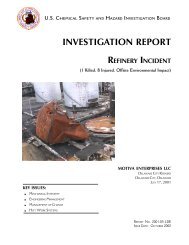Little General Store Propane Explosion - US Chemical Safety and ...
Little General Store Propane Explosion - US Chemical Safety and ...
Little General Store Propane Explosion - US Chemical Safety and ...
You also want an ePaper? Increase the reach of your titles
YUMPU automatically turns print PDFs into web optimized ePapers that Google loves.
<strong>Little</strong> <strong>General</strong> <strong>Store</strong> September 2008<br />
early in a firefighter’s career. In contrast, chemical facilities <strong>and</strong> refineries in the United States that<br />
maintain hazardous materials response teams are required to train team members annually. 44<br />
The required hazardous materials incident response training teaches firefighters to identify hazardous<br />
materials <strong>and</strong> incidents involving hazardous materials, use DOT’s Emergency Response Guidebook, <strong>and</strong><br />
recognize when additional resources are necessary. The training instructs firefighters to take only<br />
defensive actions when encountering a hazardous materials incident; it does not give firefighters the<br />
knowledge or skills to enter the area of the release <strong>and</strong> attempt to stop the release. This action is reserved<br />
for organized hazardous materials response teams.<br />
The IC at <strong>Little</strong> <strong>General</strong> attended a hazardous materials incident response course in 1998. This was a<br />
higher-level course than required (see Section 6.3 for requirements), <strong>and</strong> included topics such as incident<br />
risk assessment, selection of personal protective equipment, <strong>and</strong> control techniques, <strong>and</strong> a practical<br />
exercise. However, this training occurred nine years before the <strong>Little</strong> <strong>General</strong> incident, <strong>and</strong> the CSB<br />
found no documentation that the IC had attended refresher training or practical exercises. Unrehearsed<br />
knowledge decays over time; hazardous materials incident response skills acquired in training are more<br />
difficult to retain without regular refresher training or practice. 45<br />
5.4.2 <strong>Propane</strong> Industry Training for Emergency Responders<br />
The <strong>Propane</strong> Emergencies training program offered by PERC <strong>and</strong> the NPGA is free to fire departments<br />
around the United States. The program trains first responders to recognize the specific hazards of a<br />
44<br />
29 CFR 1910.120 requires industrial hazardous materials incident responders to attend eight hours of refresher<br />
training annually.<br />
45<br />
For a full discussion of skill loss, see Arthur Jr., W., Bennett Jr., W., Stanush, P., & McNelly, T. (1998). “Factors<br />
That Influence Skill Decay <strong>and</strong> Retention: A Quantitative Review <strong>and</strong> Analysis,” Human Performance, Vol. 11,<br />
pp. 57-101.<br />
43









